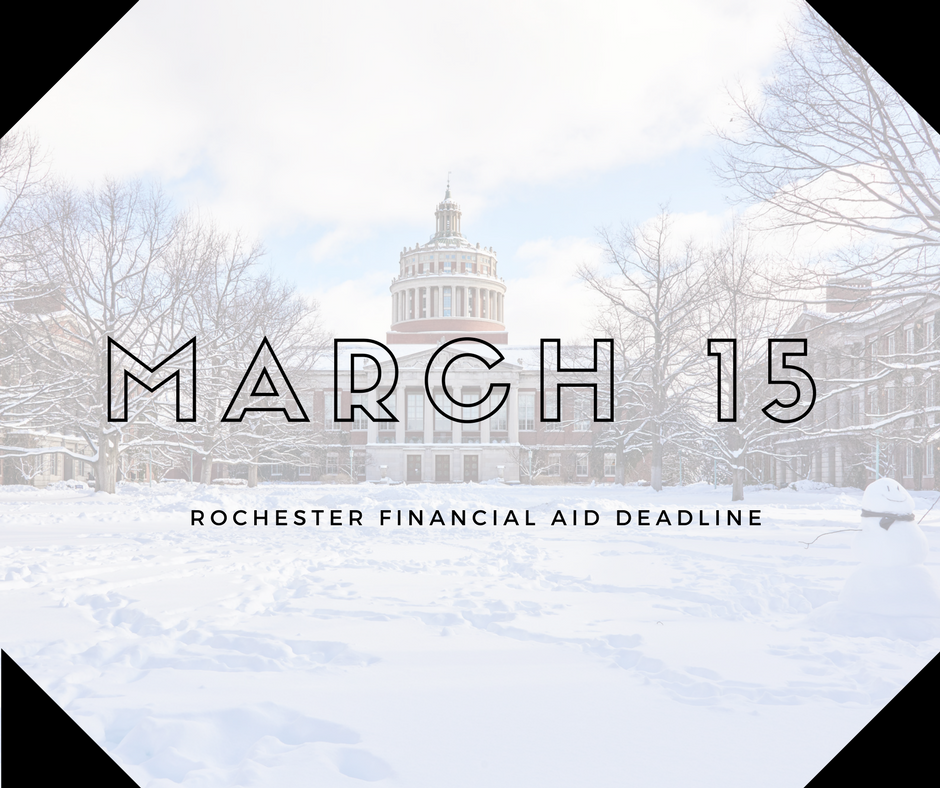Happy spring, Rochester! We definitely aren’t experiencing Winter Storm Stella right now. Not at all.
As some of you have heard (and seen on our pamphlets around campus), the deadline for applying for financial aid for the 2017–18 academic year is earlier than in previous years. All documents are due on March 15 this year. Why the change? It’s all tied to a new policy from the Department of Education called “Early FAFSA,” or “Prior-Prior Year.” While this new process is not a massive change in the way that financial aid is analyzed and awarded, it’s still a shift that you need to be aware of.
What is “Early FAFSA”?
In years past, the baseline for determining financial aid eligibility was tax and income information from the most recently complete tax year. For example, for the 2016–2017 academic year’s aid was based on 2015 income. This is known as the “Prior Year” model of determining aid eligibility. Starting with the coming 2017–2018 year, the Department of Education moved to a “Prior-Prior Year” model going back two full tax years. That means for the upcoming academic year, aid packages will be based on the same tax information that the current year’s aid was. The Department also made the FAFSA available on October 1, instead of January 1 as in years past.
The “early” aspect of the FAFSA is two-fold: your aid will be awarded based on earlier tax information and your application for aid is available to you earlier than in the past.
What does that mean for my aid eligibility?
For one thing, the formula for determining eligibility for financial aid is not changing; the data that’s put into the formula is different. The main difference is that your family’s income information for the application will be a little further in the past. In many cases, family incomes don’t change drastically from year to year (which partially led the Department of Education to adopt this model, confident that it will be effective for determining aid eligibility that still suits families’ situations). However, the Department (and the University) also recognizes that this isn’t the case for all families. Things like unemployment, divorce, and unforeseen medical expenses come up all the time.
The “Prior-Prior Year” model means that your aid eligibility is based on circumstances that are further in the past, and substantial changes to income and family circumstances may mean that this new system doesn’t line up with your reality.
What do I do if 2015 income doesn’t line up with my “here-and-now” situation?
The first and best thing to do is email your financial aid counselor or call our office to have a conversation right then or to set up an appointment. If you think your parents are better equipped to have that kind of conversation, we’re always happy to connect with them as well.
The next best thing is to prepare. While this new model represents a shift in the basis of financial aid eligibility, you know about it and its implications on your application. Discuss it with your parents if you’re home for spring break, or give them a call to let them know. They may already be aware, but it’s always good to make sure everyone is on the same page. There might be some creative solutions that you come up with together to help account for the new baseline for your aid, and we can talk those out with you.
Lastly, if you’re really concerned about a potential shortfall and difficulty in paying your bills for next year, it never hurts to check out opportunities for outside funding. Keep an eye out for outside scholarships from external organizations nationwide. There are dozens out there that receive relatively few applications, so there are many opportunities for you to seek grants. There is still a lot of time before the start of the next school year, so the earlier you start sending applications, the earlier you’ll know if you’ve been awarded anything.
We hope this information is helpful! If you have any further questions, please don’t hesitate to reach out by calling us at at (585) 275-3226 or tweeting us at @URFinAid.


